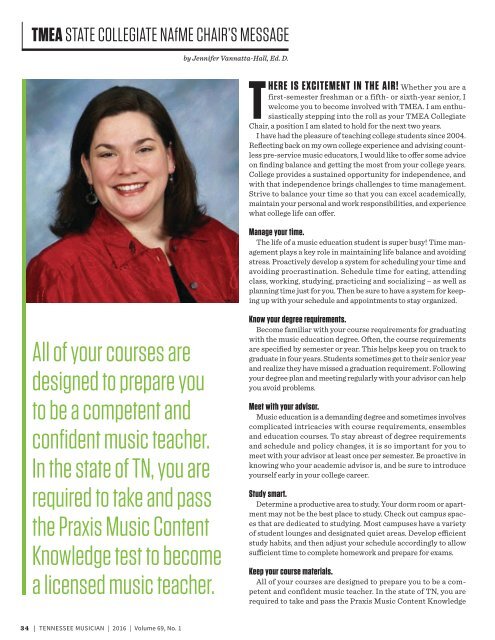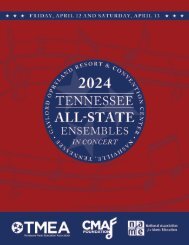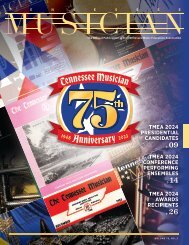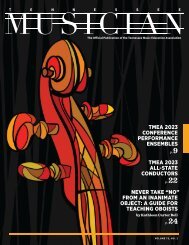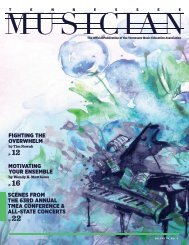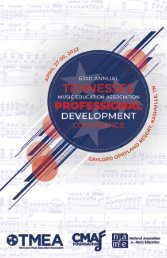Create successful ePaper yourself
Turn your PDF publications into a flip-book with our unique Google optimized e-Paper software.
TMEA STATE COLLEGIATE NAfME CHAIR’S MESSAGE<br />
by Jennifer Vannatta-Hall, Ed. D.<br />
THERE IS EXCITEMENT IN THE AIR! Whether you are a<br />
first-semester freshman or a fifth- or sixth-year senior, I<br />
welcome you to become involved with TMEA. I am enthusiastically<br />
stepping into the roll as your TMEA Collegiate<br />
Chair, a position I am slated to hold for the next two years.<br />
I have had the pleasure of teaching college students since 2004.<br />
Reflecting back on my own college experience and advising countless<br />
pre-service music educators, I would like to offer some advice<br />
on finding balance and getting the most from your college years.<br />
College provides a sustained opportunity for independence, and<br />
with that independence brings challenges to time management.<br />
Strive to balance your time so that you can excel academically,<br />
maintain your personal and work responsibilities, and experience<br />
what college life can offer.<br />
Manage your time.<br />
The life of a music education student is super busy! Time management<br />
plays a key role in maintaining life balance and avoiding<br />
stress. Proactively develop a system for scheduling your time and<br />
avoiding procrastination. Schedule time for eating, attending<br />
class, working, studying, practicing and socializing – as well as<br />
planning time just for you. Then be sure to have a system for keeping<br />
up with your schedule and appointments to stay organized.<br />
All of your courses are<br />
designed to prepare you<br />
to be a competent and<br />
confident music teacher.<br />
In the state of <strong>TN</strong>, you are<br />
required to take and pass<br />
the Praxis Music Content<br />
Knowledge test to become<br />
a licensed music teacher.<br />
Know your degree requirements.<br />
Become familiar with your course requirements for graduating<br />
with the music education degree. Often, the course requirements<br />
are specified by semester or year. This helps keep you on track to<br />
graduate in four years. Students sometimes get to their senior year<br />
and realize they have missed a graduation requirement. Following<br />
your degree plan and meeting regularly with your advisor can help<br />
you avoid problems.<br />
Meet with your advisor.<br />
Music education is a demanding degree and sometimes involves<br />
complicated intricacies with course requirements, ensembles<br />
and education courses. To stay abreast of degree requirements<br />
and schedule and policy changes, it is so important for you to<br />
meet with your advisor at least once per semester. Be proactive in<br />
knowing who your academic advisor is, and be sure to introduce<br />
yourself early in your college career.<br />
Study smart.<br />
Determine a productive area to study. Your dorm room or apartment<br />
may not be the best place to study. Check out campus spaces<br />
that are dedicated to studying. Most campuses have a variety<br />
of student lounges and designated quiet areas. Develop efficient<br />
study habits, and then adjust your schedule accordingly to allow<br />
sufficient time to complete homework and prepare for exams.<br />
Keep your course materials.<br />
All of your courses are designed to prepare you to be a competent<br />
and confident music teacher. In the state of <strong>TN</strong>, you are<br />
required to take and pass the Praxis Music Content Knowledge<br />
34 | TENNESSEE MUSICIAN | 2016 | <strong>Vol</strong>ume <strong>69</strong>, <strong>No</strong>. 1


